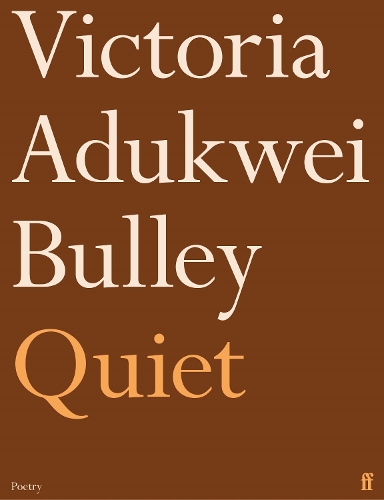Quiet (Shortlisted, TS Eliot Prize)
Victoria Adukwei Bulley
(Faber and Faber, 2022); pbk, £10.99
(Ed: please note that the lineation and spacings may not display as in the original when reading this on a mobile device.)
I have always loved this quote from George Eliot’s Middlemarch: “If we had a keen vision and feeling of all ordinary human life, it would be like hearing the grass grow and the squirrel’s heart-beat, and we should die of that roar which lies on the other side of silence.” And so it is… quiet isn’t silence. Victoria Adukwei Bulley’s Quiet engages with the ordinary and extra-ordinary lives of black women in ways that are life-enhancing but which also doesn’t duck the tragedies of discrimination and social injustices. In seeking an imaginative sanctum that isn’t hostage to how black people are violated, othered or marginalised, Quiet undertakes a difficult balancing act. It begins with a warning early in the collection,
check if you want to
but you won’t find any
lyric shame here.
we don’t do that, no;
we nuh have dat here.
Adukwei Bulley is all too aware that the inside needs shelter from the outside. And a world that straightjackets black womanliness needs resisting, for what women are and what women desire, bear the imprint of culture and socialisation. In the ‘Girls in Arpeggio’ series, exotic stereotypes, the use of hair relaxants, creams, and other everyday practices which turn women into ‘poster girls/for the effacement of themselves’ are criticised. Yet if the sharpness of the collection’s political critique is necessary—displayed also in an array of poems such ‘Pandemic vs Black Folk’ where the virus and social distancing are potent metaphors—the effects of such acts on interior life is woven contrapuntally in other more emotionally raw work such as ‘How not to Disappear’. After an epigraph gleaned from Evidence Joel on the absurdity of police reactions to a black woman’s anguish following the disappearance of her son, the poem imagines the prayers of black folk walking home at night, fearful of being disappeared:
God, you’ll say, below your breath, let no strange man put hands on me, let the dark not drape this body on terms other than its own; speed me to the door, let the first key be the right one; the mechanism oiled and easy.
Attentive to sound in the way some phrases are repeated; elsewhere to the quiet frisson effected by the small transitions between languages (ga, Portuguese, English) or different rhetorical registers (philosophical, lyrical, vernacular); inventive in its use of lineation, punctuation and spacings, and also the way poems are laid out on the page, Quiet is a collection that grapples with poetics as head and heart. Quotidian creative writing exercises such as blacked out erasure poems are inventively transformed in the pairing, ‘black noise’ and ‘white noise’. If at times, that sheer diversity seems to indicate a writer testing out rather than settling, this can’t be a bad thing in the growth of a poetic sensibility.
Yet amidst the collection’s busyness, attentiveness to the ordinary is a deep pool for all readers. In ‘Fifteen’, the adult poet comes across some words in a forgotten Valentine’s card sent by an admirer in her youth; the ‘blue boy’ of the past might gesture towards transience but this is ‘deceptive’ for he
Looks lifelong, actually to me Still stuck here moulding Mason jars of words to preserve him with.
In ‘Of the Snail & its Loveliness’, the creature ‘so small/ so young its shell was still transparent’ sparks a shared moment of reciprocity, and an epiphany on love and home:
Love,
this way, we might say,
this way,
holding, sometimes, the other
sometimes the lonely self
until it can be said, love,
we are home now.
Near the end in ‘Air’, ‘Quiet as it’s kept’ (a phrase of Toni Morrison) acknowledges the damage that silence as voiding and erasure brings; but this is recast:
What grace. Allow what is simple to be simple. Accept it as truth. Quiet as it’s kept we help the trees to breathe too.
Moving and thoughtful lyric reflections, ‘with room enough left for the possible, with scope enough for the imaginary; dark & potent as space itself… [as] she says: there now; see, here I am.’
Gail Low


Leave a Reply